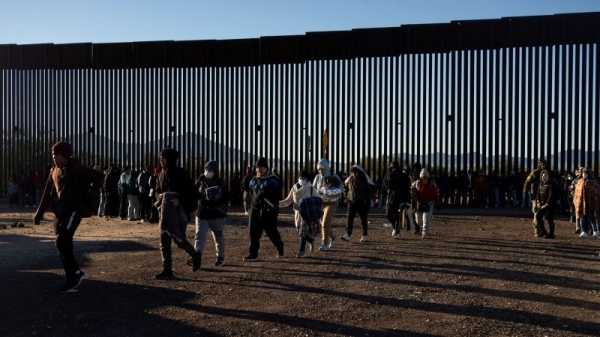
Despite advances in gender equality, women remain outnumbered by men in international security and defence positions, ambassadors and experts have told Euronews.
This is especially true when it comes to hard defence topics including conversations dealing with the military as the field has been traditionally male-dominated.
“We’re making progress, but some reflexes die hard and women remain underrepresented in the high-level meetings I attend,” said French ambassador to NATO Muriel Domenach in an interview with Euronews.
“I have always taken part in meetings where there were very few women and the higher the level and the degree of importance of the so-called hard security issues, the fewer women are present,” she added.
Domenach is one of just six female ambassadors to NATO, a security and defence alliance with 30 participating countries that has taken on new importance amid the war in Ukraine.
She pointed out that when West Germany joined NATO in 1955, an accord was signed by all male ambassadors.

“If you look at the signing of the accession protocol of Sweden and Finland at the beginning of last July last, you will see that there were six women out of 30 allies, that is to say, 20%.”
Canada’s former ambassador to NATO, Kerry Buck, who is the only woman to have served in the role for her country, told Euronews that many major countries are now represented by female ambassadors but that numerically it remains “quite lopsided”.
“When you’re a woman ambassador representing your country, you are seen by other diplomats as the representative of your country. So in my experience, I didn’t see any different reaction to me as a Canadian ambassador, any different treatment, any discounting of my voice,” said Buck.
“But where I do think there’s a difference in the ladders up to those positions in the various countries.”
‘Different perspectives bring different decisions’
“Having different diversity of voices and experience and skill sets matter for better decisions, better policy, better diplomacy,” said Karin Johnston, a senior fellow at Women in International Security and an adjunct professor at American University.
“A diversity of voices brings in different perspectives, different ways of making decisions,” she added.
“If everybody there is white and male.. they may all reach the same conclusion simply because everybody thinks the same.”
A United Nations Security Council resolution adopted in 2000 called for the increase of women’s participation in security and peace efforts, recognising that they have an important role to play in the prevention and resolution of conflicts.
The resolution also stressed “the importance of their equal participation and full involvement in all efforts for the maintenance and promotion of peace and security.”
Johnston points out that academic reports and statistical analyses have shown the importance of diverse views in peace negotiations.
A statistical analysis in a 2015 International Peace Institute report showed that women’s participation in peace processes increased the likelihood of an agreement lasting.
According to a UN report from 2021, however, women were on average “13% of negotiators, 6% of mediators and 6% of signatories in major peace processes” between 1992 and 2019.
Seven out of ten peace processes did not include women mediators or signatories.
Buck says that women’s participation does not mean the discussion will necessarily be radically different but that women’s experiences are different from those of male diplomats and their voices should be heard.
“Having voices from women with different experiences involved in discussions on peace and security and defence is absolutely vital.”

Gender equality ‘unevenly distributed’
Johnston wrote in a 2021 policy brief that while the EU has made strides with its gender equality strategy, achievements “have been unevenly distributed and implemented”, particularly in the foreign and security policy fields.
One of the goals of the EU’s gender strategy is to achieve gender balance in decision-making and in politics.
Johnston says one of the major problems is finding data and information on women in the military and EU missions.
The lack of numbers to break down the progress was one of the reasons that German Green Party MEP Hannah Neumann started the #Shecurity Index campaign.
According to the 2022 report, women remain largely underrepresented globally in the military and police, with an average of 154 years needed to reach gender parity in global militaries.
While UN missions achieved gender parity in 2021, the report added, women’s representation in EU missions is “significantly lower”.
In 2022, women were 26.2% of the total staff in EU civilian missions. Only 23.1% of ambassador posts were occupied by women.
‘Keeping women in’
But Johnston says “it depends not just on bringing women in. It means keeping them in them so that they can make a difference and that’s what gender integration is about.”
She says that making sure women can be promoted and providing benefits such as childcare can help to make sure women stay in these roles.
Ambassador Muriel Domenach
Domenach said that there is still a view that these sectors are not women’s business which leads fewer women to enter these fields in addition to the problems with mobility within diplomacy.
But it’s changed since the time that she started out, Domenach said.
“Those who recruited us told us frankly that diplomacy, security and defence affairs were not for women, that you would not be able to have a family that you would have to choose.”
She added that just replacing people on maternity or paternity leave is a big evolution from when she started out in diplomacy.
“It’s important to have more diversity both because it’s fair and because it’s smart,” Domenach said.








Leave a Reply